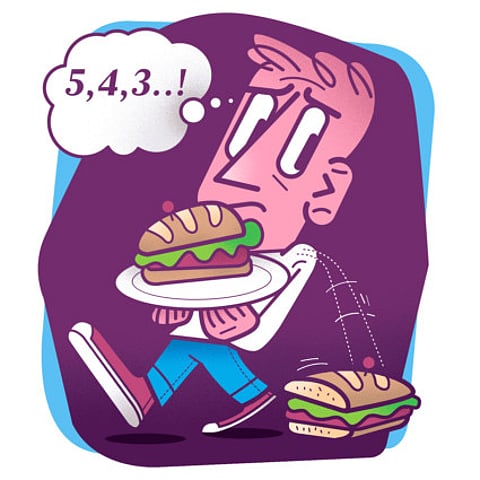Pick it up, clean it, eat it
Most readers would not worry, as long as the surface is clean

Dubai
Many of us have at some point utilised the ‘five second rule’. A piece of food falls on the ground, we pick it up within five seconds and eat it, assuming that since it was picked up quickly, it should be fine. But, a study published in the US-based journal, Applied and Environmental Microbiology, states that we are wrong to do so.
According to this study, no matter how fast you pick up the food, you will pick up bacteria with it. But, despite the various international studies that point to the same results, many people continue to follow the ‘five-second rule’ when it comes to dropping food on the ground.
Sadaf Adnan, a Pakistan homemaker based in Ajman, is one of them. She cleans the floor at home herself and thus is confident that it is clean enough.
She said: “If the floor is not dirty, at home for instance, then we can apply the five-second rule. But, the places that we know are dirty, for example when we go out to eat, then I would definitely be careful and not pick it up to eat. The same goes for tables. In a food court, if the table appears to be clean, and I don’t see any dirt on it or dropped food particles from before, then it is fine.”
She says this rule applies mainly to dry food items, such as “fast food”. She has three young children, and the same applies when it comes to feeding them. However, if the food items were wet, such as something with a gravy, she wouldn’t eat that.
Mohammad Farhan Khan, a Pakistan mechanical engineer based in Sharjah, follows the same principles. If something looks clean, it is good enough to be consumed.
He said: “Yes, if it is eatable, I would pick it up, clean it and then eat it. Otherwise, if it isn’t clean anymore or if the area is dirty, I would not just leave it there. I would still pick it up and throw it away.”
When dining out, especially in mall food courts, if something similar were to happen, Khan states he would just check to see if the surface appears dirty.
He said: “If the food fell on a dirty spot, I will put it in the trash. The same goes for my two children. What practice I follow, I will advice them to do the same.”
Hanan Abdullah Kadir, a Somalian housemaid based in Sharjah, would also pick up food that has fallen on the floor, but has a unique reason for doing so.
She said: “There are so many people in my home country that do not have any food to eat. They pick food from the garbage. I would just be eating something off the floor.”
Somalia’s food security is once again under threat, as stated by the World Food Programme (WFP). The situation is the worst in rural areas, due to consecutive seasons of poor rainfall. As of September 2017, more than 3 million people cannot meet their daily food requirements, with 800,000 on the brink of famine.
According to WFP estimates, 388,000 children under the age of five years are acutely malnourished and thousands face a high risk of disease and death.
Kadir said: “I have an 11-year-old son. I keep teaching him about the importance of food. I show him videos and pictures of poor people in our country, who are dying because of a lack of food. By doing this, I am able to teach him to not waste any food. If it is clean, eat it.”
A detailed study conducted by the US-based Rutgers University, the five-second rule has some validity, in the sense that the longer a food item sits on the floor, the higher the transfer of bacteria. However, no fallen food escapes contamination completely.
According to the US-based Centres for Disease Control, surface cross-contamination is the sixth most common contributing factor, out of 32, in outbreaks of food-borne illnesses.
Keeping these facts in mind, Twinomugisha Micheal, a Ugandan security guard based in Dubai, is very careful about food that has fallen on the floor. In order to ensure good health, he avoids picking up food and consuming it.
He said: “If I am eating something, which falls on the ground, I would just pick it up from there and drop it in the bin in order to maintain a better and clean environment for the people to live in. This is because it now has germs on it and is probably not good for my stomach and health. And if I leave it there, it’ll cause problems for the envionment and other people.”
It also depends on the type of food. If he dropped a fruit, for example, he might consider eating it after he has checked it and not found any damage. In this instance, he would wash it properly and then eat it. But, if there is clear damage on the fruit, then it’s a no. “I would throw it immediately, because it could be harmful,” he added.
Shubham Sachdeva, an Indian business owner based in Dubai, would do the same. He is concerned about hygiene issues and the diseases that the food could possess.
He said: “I wouldn’t eat it for hygienic reasons. It could have picked up bacteria, or salmonella virus. But, I have been taught to respect food, so I would pick it up and put it in a place where a bird or animal could eat it.”



